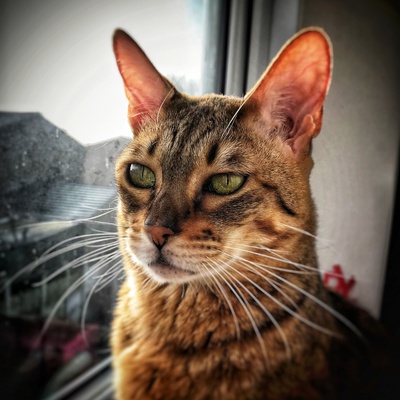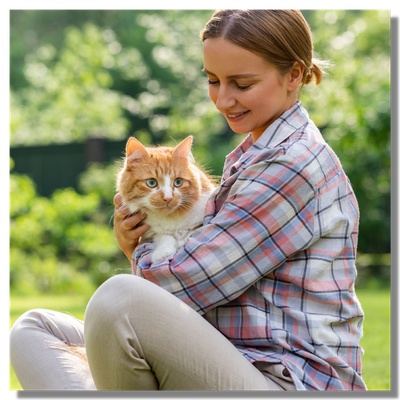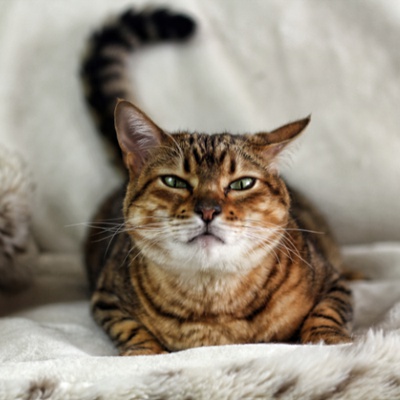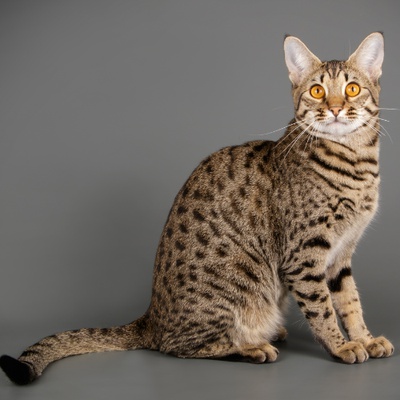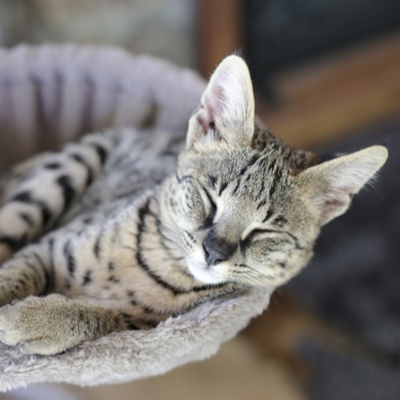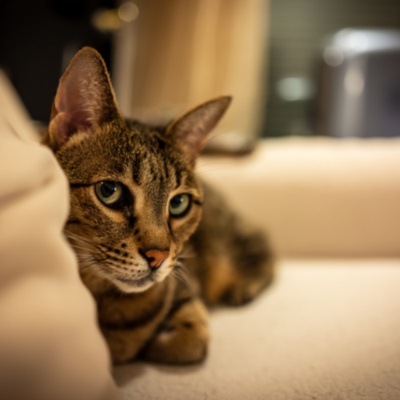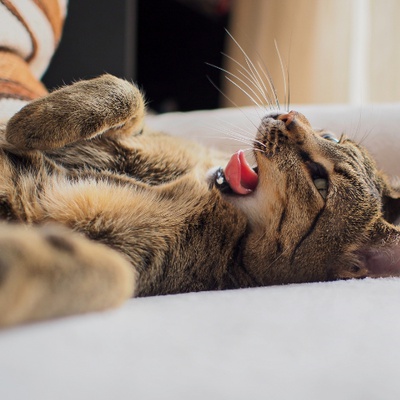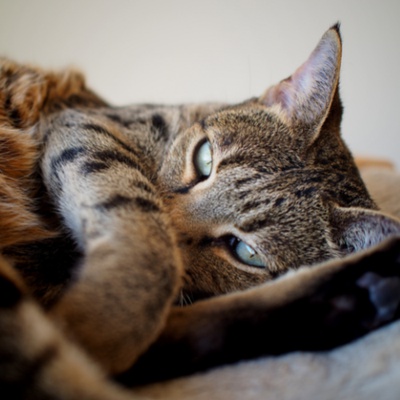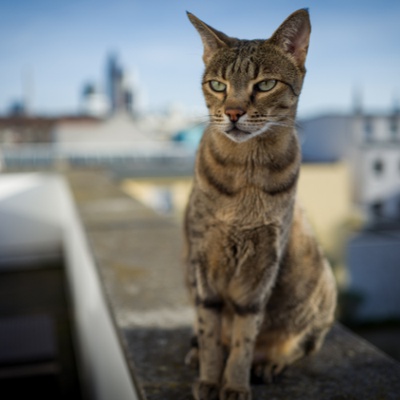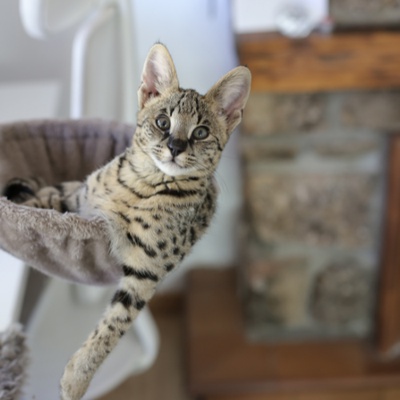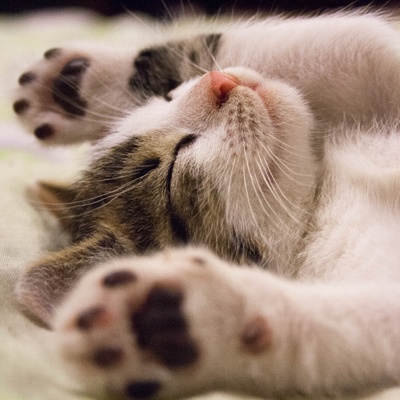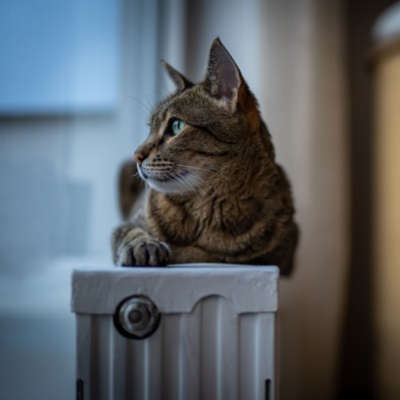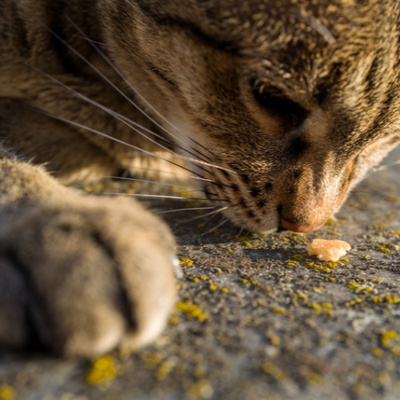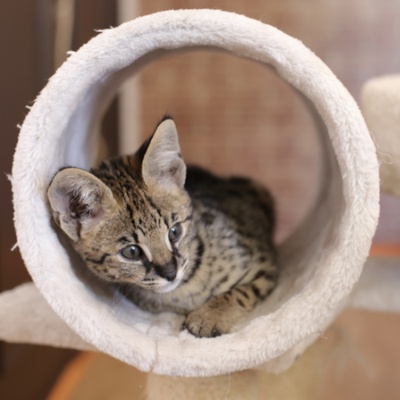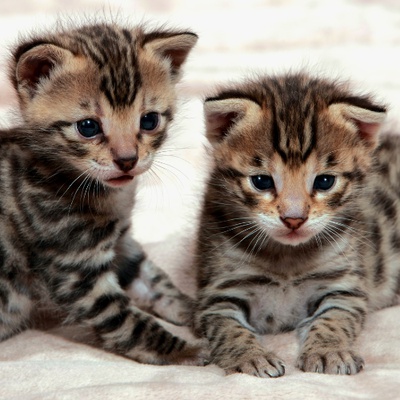Introducing the Savannah
Find out everything you need to know about the Savannah: its characteristics, its behaviour, its training and how much one costs.
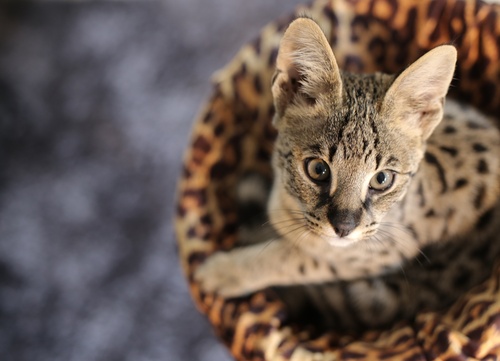
Find out everything you need to know about the Savannah: its characteristics, its behaviour, its training and how much one costs.
The Savannah is a new breed of cat that was introduced in the 1980s in the United States. It is the result of a cross between a Bengal cat and a Serval, a wild cat from Africa. This mix gives the Savannah a wild look and a unique personality! Its spotted coat and its long, athletic build make the Savannah look like a miniature cheetah. Very sociable and affectionate, it is the perfect family pet.
This section outlines the unique features of the Savannah breed of cat.
The Savannah leads the way among large domestic cats. It can grow up to 18 inches tall.
The Savannah has a short, silky coat. This makes it a very easy coat to care for.
If you have allergies, a Savannah is the ideal choice! Its coat is actually hypoallergenic.
The Savannah has a unique, distinctive coat. They are usually golden or copper coloured with black spots and a white belly.
The Savannah is an active, athletic cat that has a lot of energy to burn! It needs a house or a large flat with enough space for it to run and play.
There are several different generations of Savannah cats. Some generations are much closer to the Serval and as a result are "wilder". The domestic Savannah is an affectionate and very sociable cat.
The Savannah is a very robust cat. It has no particular health problems and no known inherited diseases.
The Savannah cat is well known for its exceptional intelligence! They are particularly good listeners and fast learners, quickly taking in new information.
We can help you!
Every cat has its own character and specific needs. Making the right choice will ensure his well-being and yours.
Thanks to our quiz, you'll know which breed is right for you, depending on your lifestyle, expectations and many other criteria.
Don't wait any longer and take the quiz to find out the answer!
The Savannah is known for its distinctive coat and its considerable size. It's actually one of the largest pedigree cats in the world.
The Savannah is an extremely large cat, usually measuring 18 inches at the withers, but easily reaching 19 inches. It has a long and very athletic build, similar to that of a small cheetah.
As for weight, the males are heavier and more muscular than the females. A male Savannah cat weighs between 13 and 31 pounds and a female can weigh up to 22 pounds. They are impressively muscular and powerful cats.
The Savannah has quite a long growth period. It only reaches its final weight and size when it turns two years old.
The Savannah has a short, incredibly soft coat.
It hardly sheds any fur, unless it is stressed or moulting, and unlike cats like the Ragdoll for example, its wild looking fur is actually hypoallergenic.
This makes it the ideal pet if you are allergic to cats, as it sheds very little and produces less of the Fel d1 protein allergen than other cats. Even so, some allergies are very severe. It's worth taking precautions and checking carefully before adopting a Savannah.
The Savannah has a unique coat! It has irregular black spots all over its body, making it look like a small cheetah. The Savannah's coat also has a distinctive colour, ranging from gold to copper. It has spotted tabby markings.
The Savannah’s short coat is extremely easy to maintain. Unlike long-haired cats, its fur doesn't tangle or get matted and doesn't trap dirt.
To keep its beautiful coat in perfect condition, we recommend brushing it every now and then, when you think it needs it or after a good walk.
Savannah cats have a few more surprises in store! Underneath its imposing size and cheetah-like coat, this is a very muscular and athletic cat. Its sleek, slender build makes it a powerful and energetic cat.
The Savannah has a long, narrow, triangular head. It has a small muzzle and large, low, slightly rounded ears, like the Serval. Its large, pale, almond-shaped eyes are green or golden. Lastly, it has a short, thick tail with a black tip.
Savannah cats are very low maintenance! Their short coat means they don't need regular grooming. They moult twice a year, but even then they don't lose much hair, unlike the Maine Coon for example.
Plus, Savannah cats love water! They get that from the Serval, which lives in the wetlands and humid savannahs of Africa. So they won't mind a quick bath. Just make sure you use shampoo suitable for cats.
The Savannah has a unique, sometimes unpredictable temperament. Once you win them over though, they are gentle, affectionate pets.
Since it was first introduced, the Savannah has undergone a number of changes. They are produced by crossbreeding a Serval with a domestic cat. So, Savannah cats are classified by generation.
This generational classification determines the sociability of the Savannah cat. F1 and F2 cats are much closer to the Serval and therefore more unpredictable. From the F5 generation onwards, Savannah cats are friendlier and more sociable. They are perfectly suited to living in a family with children.
The Savannah is an affectionate cat that loves cuddles! They love spending time with their humans and aren't afraid of strangers. They get along well with other cats, and especially well with cats of their own breed. Despite this, they are still quite independent cats who enjoy a bit of alone time.
As a high-energy breed, the Savannah needs a lot of attention and gets bored easily. If they feel like they’re being ignored, they have a tendency to destroy things. These very vocal cats will make their feelings known with their long meows!
The Savannah adapts as easily to city life as to country dwellings. Having said that, it does need enough space to live happily. A large flat or a house is ideal for a Savannah cat. They are very active and love climbing and jumping. They need their own space and toys to play and exercise - cat trees, scratching posts, as well as hanging platforms and tunnels. Cheeky and very curious, Savannah cats will spend hours playing with their owners.
The Savannah is an athletic cat that enjoys being outdoors and going for walks. When you do let your Savannah out though, you should keep it in a secure, enclosed area, either on a lead or wearing a cat tracker. This is a cat that tends to bolt and can be a real Houdini. Its wild-looking appearance can then either alarm unsuspecting members of the public or sadly attract the attention of people who are up to no good.
The Savannah is an exceptionally intelligent cat. They form incredibly strong bonds with their owners, becoming their very best friends. These cats are excellent listeners and fast learners. As a result, you should find it pretty easy to train them and teach them some tricks.
Last but not least, just like their doggie friends, Savannahs love being walked on a lead!
Choosing a cat that matches your personality and lifestyle will ensure your well-being and his!
The Savannah is a strong, healthy cat. It's one of the few breeds of cat that has no known hereditary diseases.
The Savannah is genetically resilient and therefore not prone to disease.
Like all cats, they need to visit the vet to be vaccinated against common feline diseases and infections like Feline infectious enteritis (FIE), Cat Flu, and Feline leukaemia virus (FeLV).
Savannah cats have a life expectancy of between 13 and 20 years.
Savannahs need the right diet to keep them not only healthy but in top condition. This large, muscular breed needs a very high-quality, nutrient-rich diet.
This means avoiding supermarket kibble and industrially produced food, which is often remarkably high in sugar and salt. Instead choose premium kibble which is natural and bursting with flavour!
You can also feed your Savannah red meat or chicken. Rich in proteins and healthy fats, meat is the perfect food for this large carnivore. You should nonetheless vary its diet and alternate between meat and kibble or a little wet food for hydration. Your vet will be happy to advise you on the best diet for your Savannah.
The Savannah is a highly desirable and very rare breed of cat.
In the United States, while Savannah cats are recognized as domestic cats by The International Cat Association and are legal in many states, there are specific restrictions, especially on the early generations of these cats.
Some states have outright bans on all Savannah cats, while others restrict ownership of early-generation Savannahs (F1 and F2). For example, states like Hawaii, Rhode Island, Nebraska, and Georgia do not allow Savannah cats at all. In New York, only Savannah cats of F5 generation or later are permitted. It is important for individuals to check their local laws before adopting a Savannah cat.
Lastly, mandatory electronic identification, like microchipping, is not always mandated at the federal level in the United States for cats. However, microchipping is widely acknowledged as a successful way to permanently identify pets and increase the possibility of reuniting lost pets with their owners.
Savannahs are one of the most expensive pedigree cats on the market. Prices start at around
and can exceed
.
It all depends on the generation. Savannahs from higher generations (F1, F2, F3, F4) are sought after for their unusual genetics and rarity. Savannah F5 generation kittens range from
to
.
If you'd prefer to adopt an adult Savannah, the price will be much lower.
In addition to its purchase price, annual expenses for a Savannah are between
and
.
Adopting a cat like this needs careful consideration. Its temperament and requirements aren't for the faint-hearted. Taking on a Savannah is a long-term commitment, once a Savannah has adopted you, you belong to each other for life!
Choosing a cat that matches your personality and lifestyle will ensure your well-being and his!
